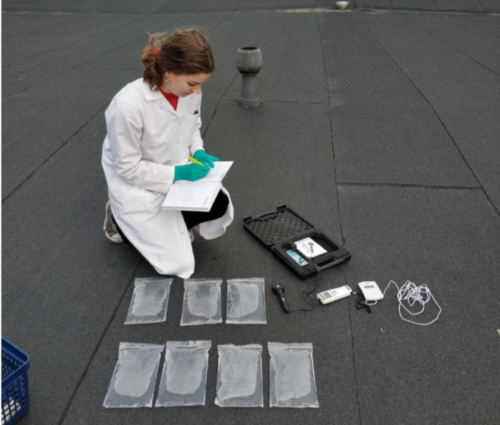What is it like to combine social themes and laboratory work in one thesis? Anni Juvakoski found out this spring while writing her master’s thesis about solar water disinfection.
Starting out – sunshine and rainbows
A year ago, I was looking for the perfect master’s thesis topic. I specifically wanted to combine my background in microbiology with my interest in water related development studies. With help from Maija Taka and other department staff, I was introduced to the idea of writing a thesis about solar water disinfection (a.k.a. SODIS). The topic would combine technical and social standpoints, and I would hence work for both the Water and Development as well as the Water and Wastewater Engineering research groups. So really a perfect topic! But what is SODIS, you might ask? It essentially means that you can put water containing pathogenic bacteria in a plastic bag or bottle, leave it out in the sun for a couple of hours and then drink that water. The disinfection is largely based on ultraviolet radiation of the sun.
Convinced? Even if it may sound too good to be true, SODIS is backed up with a myriad of studies and it is currently being used by around six million people in developing countries. However, there are a couple of unknown things with this method, which is where my study comes in. First, it has been unclear whether SODIS works in cold conditions. Or in other words, could it be promoted to e.g. people living on the snowy peaks of the Himalaya? Second, could there be an affordable, easy and acceptable way of destroying bacterial endospores (basically slumbering bacteria wearing armors) with SODIS? I explored these questions in the lab with help from my advisor Irina Levchuk.
The third aspect I looked at was why this method has not spread to more people, despite it has been proven effective and has close to zero-costs. Although SODIS is not perfect (e.g. it is not effective against all pathogens, it does not work in rainy weather), there are still hundreds of millions of people not having access to safe drinking water who could benefit from it. Therefore, my second advisor Amy Fallon helped me to look at this conundrum through the lens of technology transfer mechanisms.
How it all went – being on cloud nine and rain on my parade
In February, I started working in the lab (and on the Water Building roof, see Figure 1) to explore the first two research questions. I also traveled to Cadíz, Spain to be able to compare my results from the cold Finnish weather to the conditions SODIS is usually utilized in. Additionally, I contacted a bunch of SODIS experts, such as scientists and specialists from aid organizations, to interview them about how SODIS information is spread and what they think about the method in general.

What I eventually found out was that SODIS does work in the cold! Therefore, you could go on a sunny hike in Nuuksio and clean your drinking water in polyethylene bags (better known as Minigrip bags in Finland). However, my endospore endeavors were not as successful. One day, I went to the lab to count my bacterial colonies and had a eureka moment. I thought for a minute that my experiments with household supplies mimicking the components of advanced oxidation processes (AOP), had worked out so well that the scientific community would shake in their boots. Before calling my parents and congratulating them on bringing up such a revolutionary thesis writer, I had another look at the results. It turned out that I just had not been looking hard enough and in fact, my experiments had not worked at all the way I hoped. I got a slice of humble pie, which was a necessary meal in this case!
Third, I learned from the SODIS experts that, interestingly enough, they themselves do not view SODIS as the ideal solution for household water treatment. On the other hand, many of them said SODIS could instead play a role in disaster relief, if plastic containers were distributed as a preparedness measure. How and where this strategy could be carried out is something I would like to explore in the future.
Closing thoughts about thesis writing – every cloud has a silver lining
Finally, I graduated this summer with many lessons learned. As a closing note, if I started writing a thesis now, I might give myself (or anyone starting up) the following advice:
- Be open-minded when you look at the data you have collected. A surprising conclusion might be lurking in there if you changed your point of view!
- Do not go to the lab thinking you will work like greased lightning today. When I tried to work super-fast, I made a ton of mistakes and had to redo the work. Just relax and work on your own pace.
- There is a ton of awesome free services you can utilize to help you:
Aalto writing clinic (a writing expert reads your text and gives helpful suggestions),
Psychology Service of Aalto (they can help you with stress or study skills),
Aurora funding database (even unexpected institutions might want to fund your work)
- Do not underestimate the value of peer support. Shout-out to my fellow thesis workers who were able to make workdays fun and stress levels drop!
Suomeksi
Kirjoitin keväällä diplomityöni veden desinfioinnista auringonvalolla. Työni sisälsi laboratoriokokeita Suomessa ja Espanjassa sekä asiantuntijahaastatteluita. Sainkin työni tueksi ohjausta sekä Vesihuolto- että Vesi ja kehitys -tutkimusryhmistä.
Keskityin työssäni kolmeen tutkimuskysymykseen. Laboratoriossa tutkin menetelmän toimivuutta kylmissä oloissa ja mahdollisuutta tehostaa sitä helposti saatavilla materiaaleilla bakteeri-itiöiden desinfioimiseksi. Lisäksi haastattelin alan asiantuntijoita, kuten tieteentekijöitä ja avustusjärjestöjen edustajia, siitä, miten teknologiansiirron mekanismit vaikuttavat menetelmän leviämiseen. Valmistuin kesällä ja kirjoitan nyt diplomityöni perusteella artikkelia.
MSc. (Tech.) Anni Juvakoski is currently writing an article about solar disinfection in cold conditions based on her master’s thesis.

